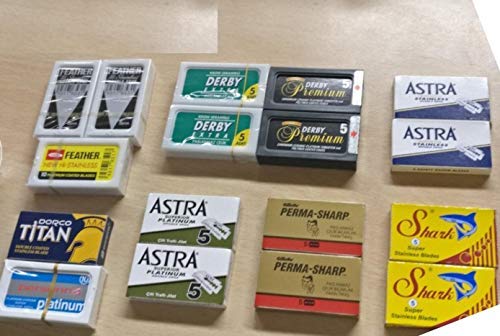Price

Personna Red Pack Israeli Double Edge Razor Blades - 10 Ct
The present study investigates the impact of different instructional approaches on the development of students' critical thinking skills in a higher education setting. Critical thinking is widely recognized as a crucial skill that enables individuals to analyze information, make informed decisions, and solve complex problems effectively. However, research suggests that traditional lecture-based teaching methods often fail to foster the cultivation of critical thinking skills among students.
To address this issue, the study compared the effectiveness of two instructional approaches: a traditional lecture-based approach and a problem-based learning (PBL) approach. The PBL approach is a student-centered, inquiry-based method that encourages students to actively engage in the learning process by addressing real-world problems or scenarios.
The study involved a sample of 120 undergraduate students enrolled in a core course in a social science discipline. Participants were randomly assigned to either the traditional lecture-based group or the PBL group. Both groups received the same course content, but the instructional methods differed.
The traditional lecture-based group experienced a series of instructor-led lectures, where the instructor presented the course material, and students were primarily passive recipients of information. In contrast, the PBL group engaged in a collaborative, problem-solving process, where they worked in small groups to analyze and discuss case studies, formulate hypotheses, and develop solutions to the presented problems.
To assess the development of critical thinking skills, a pre-test and post-test were administered to both groups. The test instrument utilized a standardized critical thinking assessment tool that measured various aspects of critical thinking, such as analysis, evaluation, and problem-solving.
The results of the study revealed that the PBL group demonstrated significantly greater improvement in critical thinking skills compared to the traditional lecture-based group. The PBL group showed a more substantial increase in their ability to analyze information, evaluate evidence, and formulate well-reasoned conclusions. In contrast, the traditional lecture-based group showed only modest gains in critical thinking skills.
These findings suggest that the problem-based learning approach is more effective in fostering the development of critical thinking skills among students in a higher education setting. The active engagement and collaborative nature of the PBL approach appear to be more conducive to the cultivation of critical thinking abilities than the passive, instructor-centered nature of traditional lecture-based instruction.
The implications of this study are relevant for educational policymakers, curriculum designers, and instructors in higher education. The results highlight the need to incorporate more student-centered, problem-based learning strategies into the curriculum to better prepare students for the demands of the 21st-century job market, where critical thinking skills are highly valued.
Future research should explore the long-term impact of PBL on students' critical thinking skills and investigate the potential moderating factors that may influence the effectiveness of this instructional approach. Additionally, studies examining the implementation challenges and best practices for incorporating PBL in diverse educational contexts would further contribute to the understanding of this pedagogical approach.
product information:
| Attribute | Value | ||||
|---|---|---|---|---|---|
| date_first_available | May 25, 2010 | ||||
| best_sellers_rank | #565,339 in Beauty & Personal Care (See Top 100 in Beauty & Personal Care) #1,079 in Men's Razor Blade Cartridges | ||||
| customer_reviews |
|

24 Hours Cancellation
We accept order cancellation before Within 24 hours the product is shipped. If the order is cancelled you will get a full refund.
30 Days Returns & Exchanges Policy
If for any reason you are not satisfied with the purchased item,You have 30 days after delivery of your order to return an item.
After 30 days of delivery of your order, we will no longer accept returns.
Refund Process & Return conditions:
To request a return,please email us at:[email protected] ,We will respond within 24 hours after
the consumer sends the email (except weekends).
If it is a quality issue, please
provide an order number and attach clear photos of the items that represent the
issue.
After we receive the returned order, our Quality Assurance department will
inspect and verify the condition of the item.Upon acceptance of your return, a refund
will be issued to the original form of payment within 1-3 business days.
Make sure your item meets all our return conditions :
Items returned without authorization will not be accepted.
The time frame for return
must not exceed 30 days from when the original order was received.
Any promotional
gifts must also be returned with your returned item.
All items must be returned in
their original condition, without scratches or signs of wear, and must not be resized or
altered in any way.
Your return needs to be sent within the given time frame(3-12
working days)
Please make sure you provide us the tracking# and receipt after you
return.
Refunds
Once your return is received and inspected, we will send you an email to notify you that we have received your returned item. We will also notify you of the approval or rejection of your refund.
If you are approved, we will credit the credit limit to your credit card or original payment method within 5 business days (bank processing time frame).
MORE FROM Personna Razors-1

















